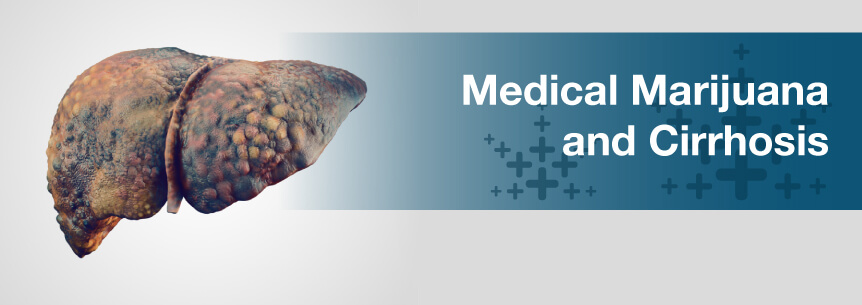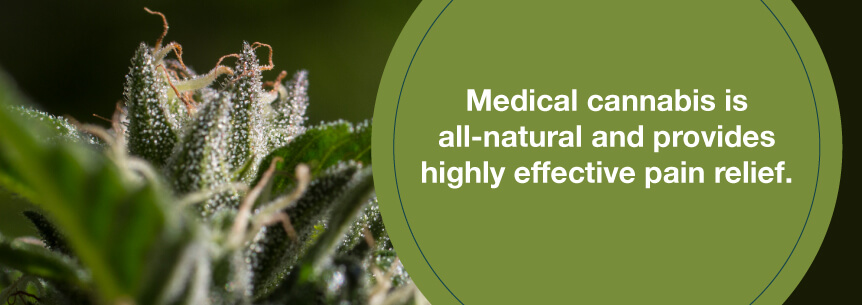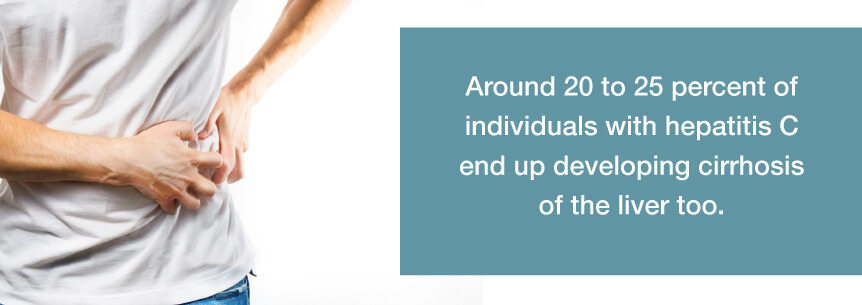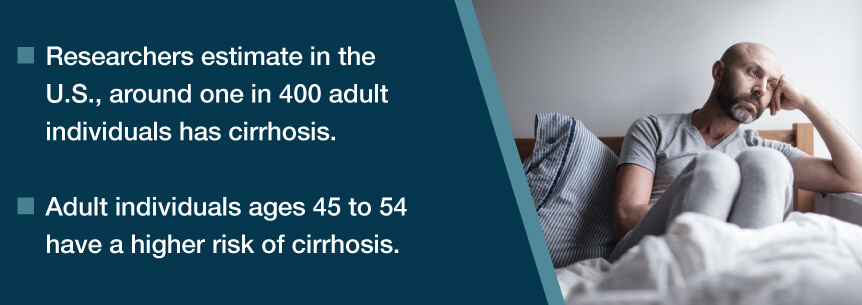
Each year in the U.S., around 31,000 individuals die from cirrhosis — primarily due to chronic hepatitis C and alcoholic liver disease. Doctors can’t reverse or cure the disease, except through a liver transplant, in some cases. Its symptoms, which include pain, fatigue and depression, can be unpleasant and interfere with daily living.
Conventional medication has an additional set of harmful side effects. Luckily, there’s now the option of medical marijuana and cirrhosis treatment to help address these unwanted side effects and symptoms.
Research on medical marijuana for cirrhosis treatment is complicated. Cannabis’ cannabinoids influence or bind to the CB1 and CB2 cannabinoid receptors of the endocannabinoid system (ECS) in your body. Certain studies implicate CB1 action in cirrhosis or other liver disease progression.
However, studies do show CB2 receptor activation offers therapeutic effects on things like:
Evidence suggests using medical weed for selectively activating your CB2 receptor could, in fact, offer the therapeutic and beneficial potential for cirrhosis and other types of liver disease.
Another 2013 study published in the journal Clinical Infectious Disease reported the regular consumption of medical pot doesn’t accelerate the progression of liver disease, particularly fibrosis. This study is one of the most comprehensive and inclusive of its kind, involving around 700 human participants. According to the researchers, this study showed there’s no link between smoking cannabis and significant HCV/HIV coinfection liver fibrosis.
Livers in individuals with cirrhosis have more CB2 receptors, although individuals without cirrhosis don’t have this issue. Because of this, researchers believe the ECS plays a crucial role in treating and preventing liver disease while maintaining a healthy immune system.
Cirrhosis has an association with inflammation, and is thereby an ECS function. People who aren’t getting enough terpenes or cannabinoids are at an increased risk for cirrhosis.
Find A Doctor Find A Dispensary
Liver disease side effects and symptoms marijuana and cirrhosis treatment can help with include:
The anti-inflammatory properties of cannabis are well-documented, and explain why it makes such a great painkiller. It’s also the reason behind using weed as a treatment for nerve inflammation — the main cause of numerous neurological conditions like MS and epilepsy. According to a study published in Liver International, there’s enough evidence to suggest cannabis’ anti-inflammatory properties protect the liver from alcohol abuse damage.
Records of high pain prevalence in chronic liver disease patients with reports estimate it’s in the range of 32 to 77 percent. And, while opioid-based treatment plans work fairly well in relieving the pain liver disease patients often experience, they do come with harsh side effects and addiction potential. Medical cannabis is all-natural and provides highly effective pain relief. Plus, it doesn’t produce these harmful side effects.

Exploring some of the strains below can help you create the perfect cannabis treatment to address all these symptoms.
Many medical marijuana patients, either self-medicating or official, have to experiment quite a bit before they find the perfect fit. Trial and error are normal parts of the process. A qualified marijuana doctor can help you choose the right medical weed strains for your symptoms. But, to get you started, you can try these effective strains.
Just like there are almost endless types of weed strains, there are also various ways you can ingest the herb to benefit from its effects. Below is a simple list of some methods you can experiment with.
Some things you may want to consider when choosing your medical cannabis and cirrhosis treatment method are if your pain is localized, if you want to medicate discreetly, whether you are looking for sustained effects and your tolerance to THC.
Conduct research on the methods if you fit any of these categories. For instance, if you’re looking to be discreet, you’d probably want to stay away from smoking and choose edibles or patches. Likewise, if you’re looking for immediate relief, edibles are probably not the way to go, and you might opt to smoke instead.
To begin your cannabis and cirrhosis treatment plan, you need to contact a marijuana-friendly doctor who can guide you to that required recommendation. Feel free to start your search for your new medical marijuana doctor here at MarijuanaDoctors.com. Jot down all the questions you have to discuss with the doctor during your online consultation.
Already have a doctor? No problem! Browse our extensive list of medical marijuana dispensaries to find your perfect cannabis products.
Find A Doctor Find A Dispensary
Cirrhosis is a severe degenerative condition where there’s damage to your healthy liver cells and scar tissue, typically due to chronic hepatitis or alcohol abuse. As tough scar tissue begins replacing your liver cells, your liver starts to lose its ability to function properly. When you have severe damage to your liver, it can result in liver failure or potentially death.
Cirrhosis can also cause dense scarring, which can slow down the normal blood flow through your liver and cause the blood to find different passages back to your heart. These passages could include your veins in your esophagus and stomach. Pressure can build up in these blood vessels, causing them to enlarge and even rupture. The real threat here is if this occurs in your esophagus blood vessels.
While there are many types of cirrhosis, these are just some of the more common types.

Since ancient times, the leading cause of chronic liver disease in developed countries has been alcohol. An inscribed Egyptian papyrus dating back to 1500 BCE reveals evidence of this disease. In the East, for millennia, people have known the hepatic consequences of consuming excessive amounts of alcohol.
In the U.S., during the Prohibition years from 1916 to 1932, cirrhosis death rates dropped significantly. During World War II, from 1941 to 1947, when the ration of wine decreased from five liters to one liter per week, cirrhosis death rates also dropped, but went back up with the reinstatement of the supply of wine.
The repeal of Prohibition profoundly impacted the public and medical health understanding of alcohol’s role in liver disease.
Often, cirrhosis doesn’t show any symptoms or signs until you already have extensive damage to your liver. When you do experience symptoms, they might include:
If you notice any of the above symptoms, consult with your doctor.
You could potentially experience certain complications of cirrhosis, including the following.
Other complications include:
Some studies show cirrhosis patients have impairment of not only physical aspects, but also of mental aspects of quality of life. In fact, one study measuring cirrhosis patients’ psychological status as it relates to their liver impairment severity showed the cirrhosis patients had signs of depression and mental distress.
Another study involving 54 men and 43 women with cirrhosis showed 62.9 percent of the patients had depression and 13.4 percent had anxiety.
Cirrhosis statistics, according to the Centers for Disease Control and Prevention, include:

The National Institutes of Health report the following about cirrhosis:
Doctors don’t have specific treatments to constitute a complete and direct cirrhosis cure. However, doctors can treat a lot of the underlying conditions causing cirrhosis, and they can cure some of these conditions. When you receive treatment for the underlying cause of your cirrhosis, it could help prevent liver failure or the worsening of your cirrhosis. Treatment might also help improve some of the scarring of your liver.
Physicians typically prescribe medication to treat the underlying causes of cirrhosis. Your doctor may advise you to stop certain activities like taking certain medications or drinking alcohol, since these could cause your cirrhosis to get worse, or they may have even been the cause of your cirrhosis.
If regular, long-term heavy alcohol consumption caused your cirrhosis, it’s crucial you stop drinking immediately. Doctors, in most cases, will suggest you enter a treatment program to treat your alcohol dependency.
Your doctor may prescribe certain medications to control hepatitis B or C-related liver cell damage.
As mentioned earlier, you can have a “backup” of blood in your portal vein supplying blood to your liver, which can cause high blood pressure in this portal vein. Doctors usually prescribe medications to control increased pressure in your other blood vessels. They can detect any signs of severe bleeding through an endoscopy. The goal is to prevent this severe bleeding.
If you’re vomiting blood or passing bloody bowel movements, you likely have esophageal varices that require immediate medical attention. Your doctor will discuss specific procedures, such as banding or injection sclerotherapy, to potentially help.
Other complications can arise, which your doctor will treat in various ways. These complications could include:
If you get an infection, your doctor will prescribe you antibiotics. Some potential side effects of antibiotics include:
Be sure to go over any possible side effects with your doctor for antibiotics or any other type of medication they prescribe to you.
Cirrhosis patients have an increased risk of liver cancer. Therefore, your doctor will likely want to perform routine imaging scans and blood tests.

Your doctor may prescribe you certain medications for high blood toxin levels.
Sometimes, cirrhosis causes damage that covers almost all of the liver and becomes irreversible. In this situation, you’d need a new, transplanted liver. You could end up waiting for a while to identify a suitable donor. Doctors often recommend liver transplants as a last resort.